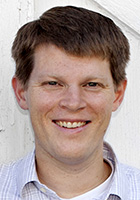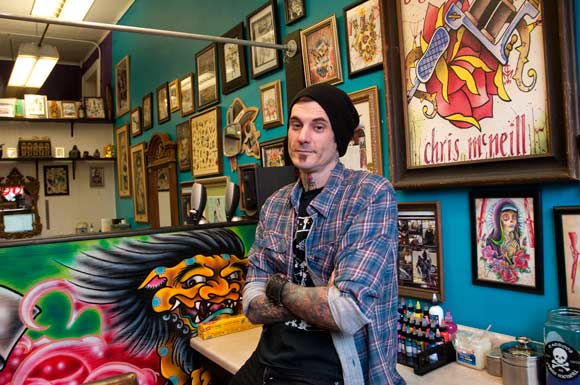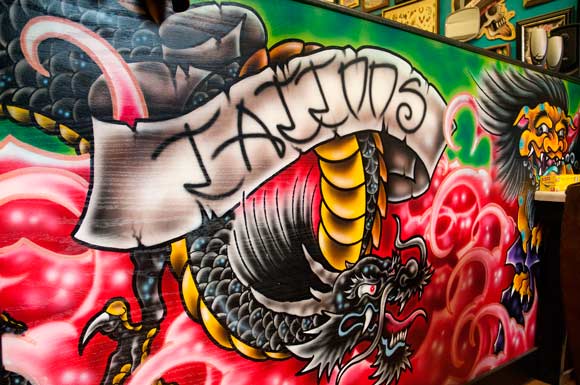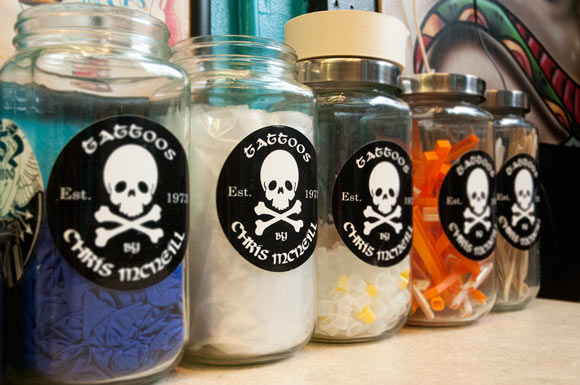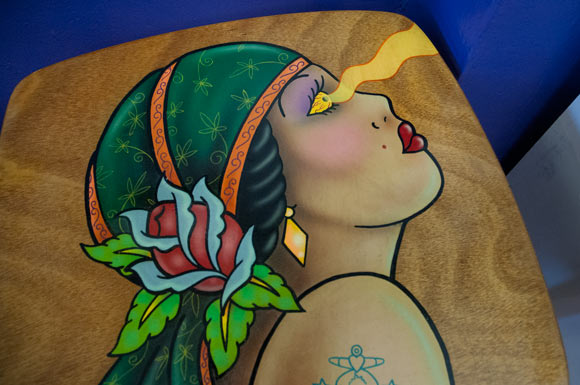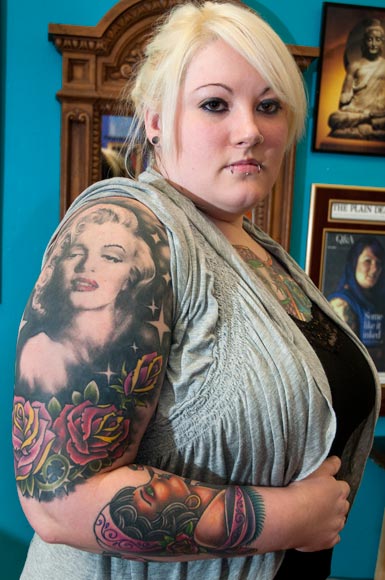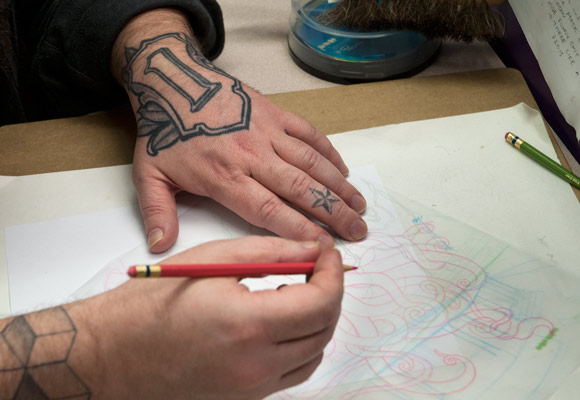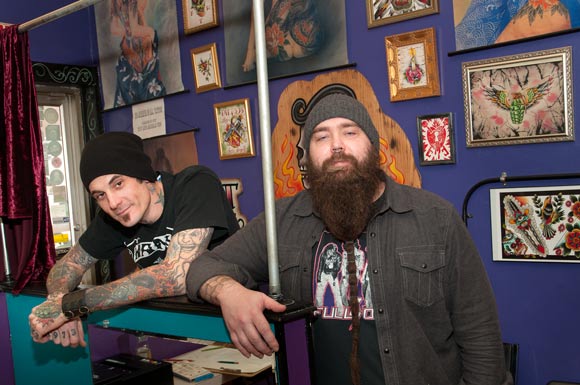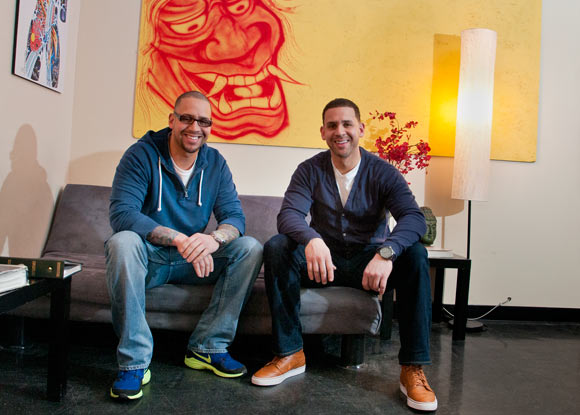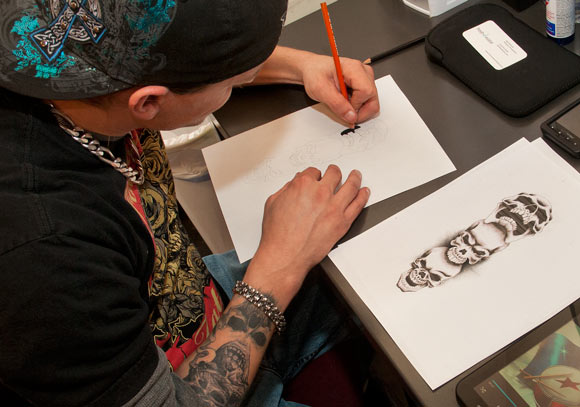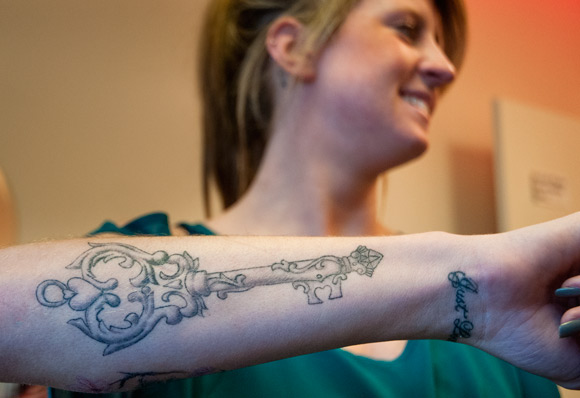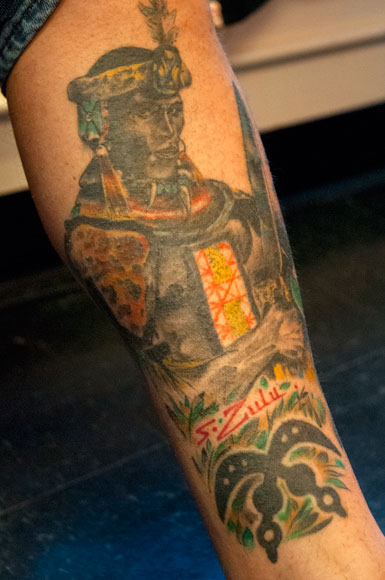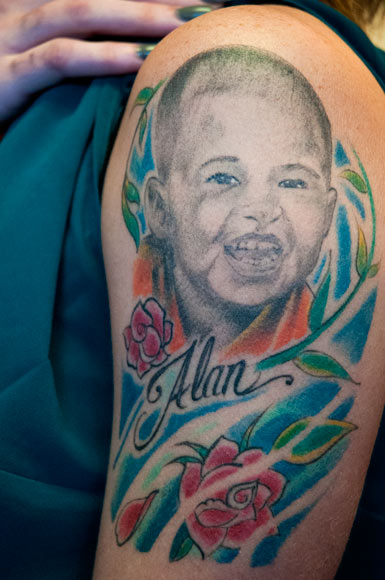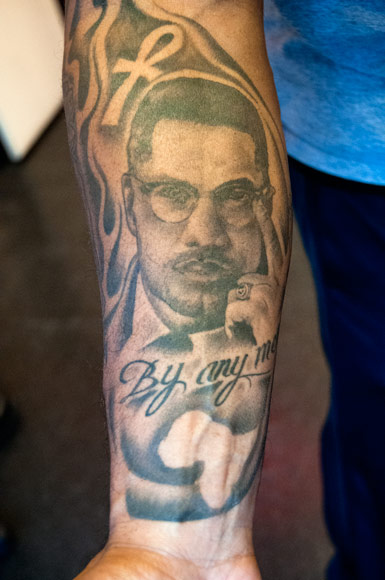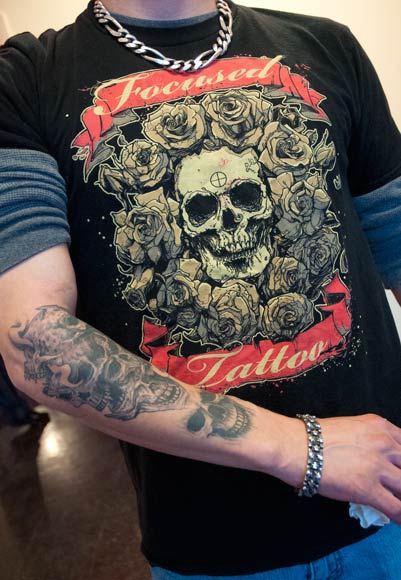from oil to ink: how artists are shifting focus from canvas to skin
The bold, blue walls of Rebel City Tattoo on Waterloo Road are lined with framed images of the kind of classic, Americana-style tattoos that have become its calling card. Skateboard decks and a wooden chair that have been gleefully sprayed with graffiti are reminders that creativity knows no bounds and blank canvasses exist everywhere.
One image on the wall, perhaps, best represents the studio’s creative fusion of one-of-a-kind tattoo artwork with street art styling. Inside a weathered frame, a painting bears the words “Tattoos by Chris McNeill” in old-school calligraphy. The antique wooden frame seems a bit out of place, as if juxtaposing high- and low-brow art.
Welcome to today’s tattoo shop -- equal parts art gallery and DIY punk club, where young, street-educated artists practice a centuries-old craft. As the tattoo market continues to heat up, new studios take flight in neighborhoods throughout Cleveland, creating viable jobs for emerging artists. With skin as their canvas, they produce new masterpieces that live outside of gallery walls.
“I’ve loved to draw since kindergarten, and we tend to focus on custom work and portraits where you don’t use an outline and it’s almost like painting,” says Rebel City owner Chris McNeill. Before coming to Cleveland in 2007 to open his own studio, McNeill spent years traveling the country learning the trade from other artists.
“I’ll paint anything -- chairs, toilet seats, blank walls, whatever,” he adds with an impish smile, as if hiding a can of spray paint in his back pocket and waiting for the right canvas.
It’s not exactly a news flash that tattoos have become decidedly more mainstream. Long the province of drug-addled rock stars, ex-cons and bikers, tats now can be spotted on even the most civilized among us. In fact, according to a recent Pew Research Center study, 40 percent of people aged 18-29 reported having at least one.
Yet even as TV shows like L.A. Ink capitalize on tattoos’ rising popularity, an alternative scene has emerged that treats them as serious (but still fun) art. These shops cater to a broad swath of individuals who are interested in tattoos as a way to express their individuality, emblazon their cause du jour or simply to add to their sex appeal.
“The whole industry is in a renaissance,” says Erin Lung, who apprenticed under McNeill and now works at Rebel City as a full-time artist. “Back in the day, tattooing was considered a trade, like being a bricklayer; they bought art and copied it onto skin. Yet these days, artists have really upped the ante and they’ve taken over.”
As tattoos have gotten both more stylish and more legit, long-cautious cities have begun allowing studios into places they once were shunned. The City of Cleveland lifted its 25-year-old band on tattoo studios nearly a decade ago, whereas the City of Cleveland Heights welcomed its first tattoo studio just two years back.
In short, tattoos, once the indelible mark of the blue-collar class, have now become the imprimatur of the residents every city is vying for: the creative class.
“Tattooing allows me to live the kind of lifestyle I want – to travel and to afford to paint,” says Dustin Nowlin, a tattoo artist who studied at the Columbus College of Art and Design for several years and now works at Cleveland Ink in the Gordon Square Arts District. “I can afford a modest but comfortable lifestyle.”
Tattoo artists can fetch roughly $100 per hour for their work, with the average-size tattoo costing $200 to $400.
Dino Tovanche, who works at Focused Tattoo on Coventry Road, is another highly skilled artist. “I went to school for art, but then I thought, ‘Now what? What am I going to do?’” he recalls. “There’s no reward in being a starving artist, but if I give someone a tattoo, I have the satisfaction of creating something, and I’ve put an immediate smile on their face.”
Of course, there are disadvantages to the budding tattoo market. First-timers often don’t know the difference between a "good" and "bad" tattoo, and shoddy shops are more than happy to take advantage of newbies. “People see celebrities and musicians with tattoos, and they decide that’s what they want,” says Lung. “But at least 50 percent of our work is cover-ups of tattoos that weren’t done right.”
“Everyone thinks they can be a tattoo artist these days, even if they don’t have art skills,” adds Jimmy Hayden, a former paramedic who parlayed his medical background into tattooing. Along with his twin brother Johnny, Hayden owns Focused Tattoo with four locations. “There’s also been a rise in unlicensed, backyard tattoo artists, and that’s a public health risk because they can spread Hepatitis and other diseases.”
Tattoo shops must be licensed through the County Board of Health, which requires training in first aid, sterilization, infectious disease prevention, among other skills. But that doesn't stop unscrupulous operators from setting up shop at home or taking their gear to the client.
The Haydens have been lobbying city and state officials to crack down on illegal tattoo operations and require additional licensing for artists, but they’re not stopping there. They also plan to open a tattoo school in North Collinwood, next door to their shop. Their long-term goal is to further professionalize the industry throughout the Cleveland area.
As for the clientele who frequent local tattoo shops, artists say they’re all over the map. “I’ve tattooed 60-somethings that always wanted one but were afraid of the social stigma, and 15-year-olds that got consent from their mom,” says Hayden, who also has tattooed LeBron James, Shaquille O’Neal and other professional athletes.
Now that the stigma of tattoos has begun to fade, people are requesting larger, more prominent body art than ever before. “At first, I was really nervous to do it, but then my boss told me that he loved it,” says Jennifer White, a Rebel City Tattoo client who repairs hand-held computers at Arrow International. White boasts a colorful, conspicuous banner of ink across her arms and chest.
With all signs pointing towards the continued growth of the market, artists like Nowlin say that it’s up to them to ensure quality and professionalism. “We as artists have to take it back and maintain control. It’s really an opportunity to take it to a new level.”
Meanwhile, the same edgy art that flourishes in our tattoo studios is now spilling out onto the streets in places like Waterloo and Gordon Square. In North Collinwood, artists recently festooned a dilapidated building with a loud, colorful mural that screams, “Welcome to Waterloo!”
“I feel like people can do what they want here, and it says something that places like Gordon Square allow tattoo studios to open up,” says Nowlin, who is working on a show of his artwork that will debut at the Arts Collinwood Gallery. “Art enriches all of our lives, and we need to be inclusive. Art is all around us.”
Photos Bob Perkoski
- Images 1 - 7: Rebel City Tattoo
- Image 5: Jennifer White apprentice at Rebel City Tattoo
- Image 7: Chris McNeill & Erin Lung of Rebel City Tattoo
- Images 8 - 14: Focused Tattoo
- Image 8: Johnny and Jimmy Hayden owners of Focused Tattoo
